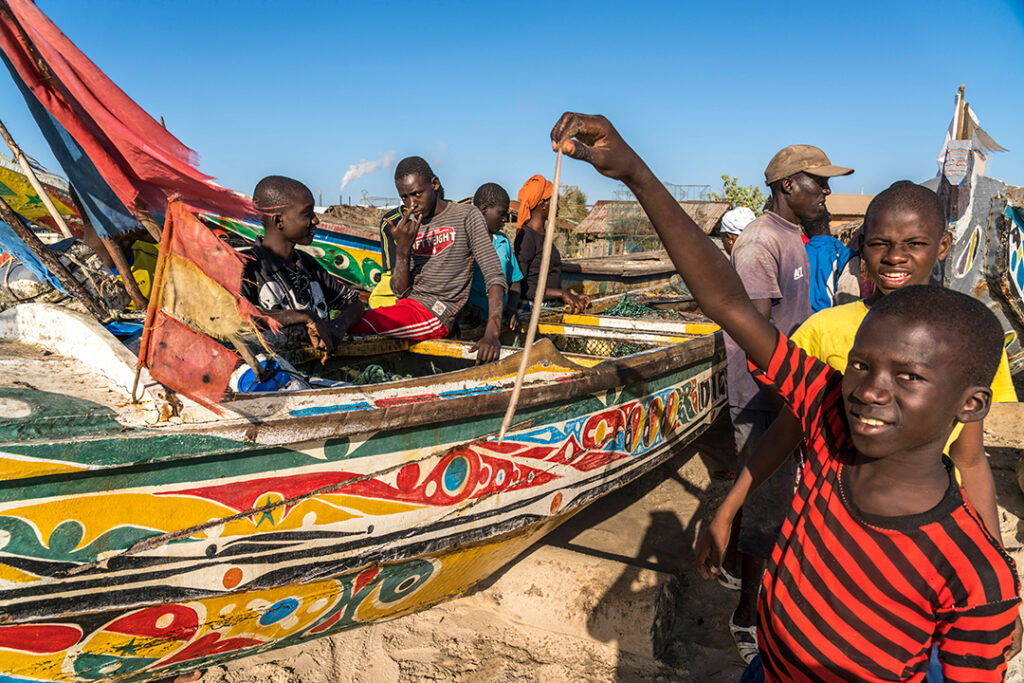ADF STAFF
Alagie Sarr remembers when fishermen in the coastal Gambian town of Gunjur could spend a few hours on the water and come back with a robust catch.
Those days are over.
Due to overfishing by foreign industrial vessels, a proliferation of fishmeal factories and a perceived lack of governmental oversight, Gambian fishermen say they are now forced to fish much farther from shore, a time-consuming, fuel-draining effort that often results in increasingly smaller catches.
“When you want a catch, you sail 50-100 kilometers at sea,” Sarr told Gambian newspaper Foryaa. “If you want a good catch, you must navigate into the deep sea. Before the advent of the factories and the trawlers, you sail in the morning and by 2 p.m., you are back with a catch. But situations change that when you leave nowadays, you’d come back in the evenings or the following day.”
Many in The Gambia’s 200,000-strong artisanal fishing community have voiced the same complaints for years.
Abdourahman Ceesay, a 28-year-old fish vendor, told Anadalou Agency in 2020 that the amount of fish he would once sell in two days now takes more than two weeks. Because fish stocks are depleted, prices have risen dramatically.
“A kilogram of ladyfish and barracuda now cost $5,” Ceesay told Anadolu Agency. “Most people cannot afford it. Some fish weigh about five or six kilograms, meaning that a customer has to shell out $20, unbearable for the pocket of an ordinary person.”
Fellow fisherman Dembo Touray agreed.
“There is no fish in the waters,” Touray told Anadalou. “We used to catch up to 90 trays of sardinella fish a day and now we barely get five trays a day.”
Touray added that industrial trawlers are “all over.”
“You can see them even less than 150 meters from the shores,” Touray said. “They use bad net size and kill fish indiscriminately.”
Former Gambian President Yahya Jammeh banned industrial fishing in 2015, but current President Adama Barrow’s administration lifted the ban in 2017, when it issued 73 licenses. More licenses have been issued since, Anadolu Agency reported.
Much of the fish caught in Gambian waters now is unloaded at three local Chinese-owned factories that produce fishmeal, which is made by drying and grinding fish or fish waste. Illegal, unreported and unregulated (IUU) fishing helps sustain the fishmeal factories.
While The Gambia partnered with Sea Shepherd Global, an international nonprofit organization, to eradicate IUU fishing, many local fishermen say the government doesn’t do enough to protect its marine resources and enters into harmful agreements with Chinese fishmeal companies.
The three Gambian fishing communities that have fishmeal factories — Gunjur, Kartung and Sanyang — have blamed the factories for killing fish by pumping toxic waste into the water and causing a loss of tourism revenue due to the foul odor the factories produce.
Gambian fishermen are also upset by the fishing arrangements their government makes with neighboring countries. In 2018, The Gambia agreed to allow Senegalese fishing vessels to sail in its waters.
The Gambia also signed a six-year deal with the European Union that allows EU trawlers to catch 3,300 tons of tuna and 750 tons of hake annually, Anadolu reported. The EU agreed to pay nearly $685,000 to improve the country’s fisheries.
The EU contribution is relatively small as West African nations lose an estimated $2.3 billion a year to IUU fishing, according to the United Nations.

